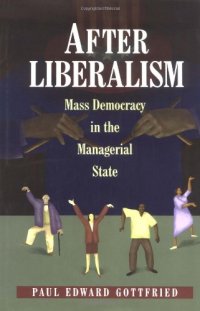
Ebook: After Liberalism: Mass Democracy in the Managerial State.
Author: Paul Edward Gottfried
- Year: 1999
- Publisher: Princeton University Press
- Language: English
- pdf
_After Liberalism: Mass Democracy in the Managerial State_ by Paul Gottfried is a very powerful and important book which shows specifically how a discontinuity existing between nineteenth century liberalism and its twentieth century version has made possible the rise of a "managerial state". Such a state has made self determination an impossibility, given the rise of a managerial elite to safeguard the public from its own "authoritarian" tendencies. Gottfried traces the corruption and discontinuity in liberalism to such figures as Jean Jacques Rousseau (who felt that man must be "forced to be free"), John Stuart Mill (who ended up advocating socialist policies), and especially John Dewey - all of whom abandoned the free market principles of original liberals. The influence of Dewey among the educational establishment cannot be underestimated. In the twentieth century the two world wars brought out a conflict between three separate types of state: the fascist state of Mussolini (which had "gone beserk" allying itself with Adolf Hitler), the communist state of Josef Stalin, and the modern managerial/welfare state brought about through New Deal legislation by FDR. During the war, the communists joined the side of the Allies and destroyed fascism, only later to die a death of their own subsequently that century. This leaves us today with the managerial state, which seeks to spread a "global democratic faith" throughout the world, while negating and containing the influences of traditional sources of community, particularly religion. The new state is pluralistic and multiculturalist (meaning that any friction that arises between different races and ethnic groups must be curtailed in alignment with the "moralistic" teachings of the managerial elite). Also, the elite seek to redistribute income by means of democracy and stoking the flames of class warfare and envy. In the United States in particular, but even more so in the European nations, the nation has been coopted by elites as a global location for massive immigration from the third world (justified by appealing to the rhetoric of "human rights", invented by the New Class precisely for this purpose). Any attempt at dissent from the dominating paradigm is shouted down as "insensitivity" or worse as outright "fascism" - a term which is consistently abused and used to stigmatize all those who adhere to traditional notions of self government. According to Gottfried, both socialist Left and neoconservative "Right" adhere strongly to these principles regarding them as near articles of faith because they allow the two dominant parties of the elite to maintain their power. Gottfried also points to a Jewish-Puritanical influence which has sought to contain dissent, particularly through moralism (which amounts to preaching an anti-racist, sensitivity-based social gospel), and shows how all beliefs contrary to this value system are deemed to be a product of "mental illness", thereby giving a therapeutic role to the elite. Such a case is particularly emblematic of Adorno's post-World War II studies in the "authoritarian personality". With the rise of political correctness in the university system, coupled with a racist national policy of affirmative action, which can be arbitrarily extended, education has been subverted and all means of dissent have been stifled. Amazingly however, the populace does not support generally the goals of the elite, which has led many who are particularly disturbed by New Class social engineering to appeal to direct democracy. Gottfried also shows how populist resistance to the managerial state has built up and found expression in movements both in the United States and Europe. For example, Gottfried cites former presidential candidate Pat Buchanan, who appealed to the tradition of an isolationist, nationalist "Old Right" as well as traditional Catholicism, and the National Front of Le Pen in France which sought to deal effectively with the immigration problem for France. Also, Gottfried notes that "postmodernist rightists" such as Alain de Benoist in France successful criticize the current state, despite disgusting attempts by postmodernist leftists such as Jacques Derrida to entirely censor them. Indeed, Gottfried provides several examples of precisely how "anti-hate legislation" is used as a weapon of tyranny by the elite managerial class to maintain their power. Unfortunately, while populist resistance does exist, it has also been severely marginalized. Gottfried seems unable to fully predict the future of the managerial state, though he obviously supports populist resistance and secessionary movements. One issue that remains important though I believe is not fully dealt with by Gottfried is how to rectify calls for a completely free market with cultural conservativism and restoration of tradition. Afterall, a completely free market would presumably have no restrictions on such things as drugs, abortions, pornography, or prostitution, things which would have to be prevented by appeals to traditional morality and religion. Also, it is difficult to see how such a thing could avoid falling into outright barbarism. In sum, however, while the future for democratic liberalism and self-determination looks bleak, given the rise of an elite class who intend to enforce their values on all citizens, populist resistance is possible, and is perhaps the only way towards counter-revolution.
Download the book After Liberalism: Mass Democracy in the Managerial State. for free or read online
Continue reading on any device:

Last viewed books
Related books
{related-news}
Comments (0)